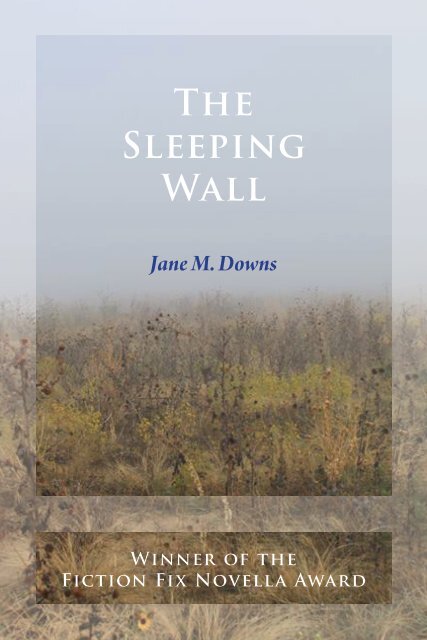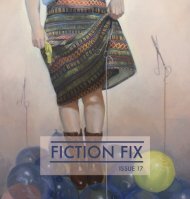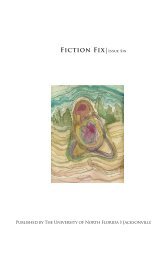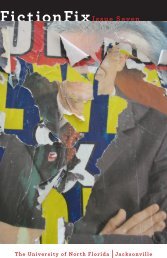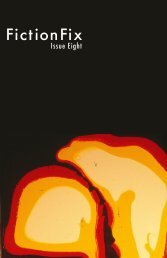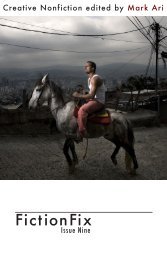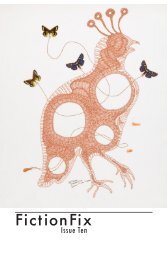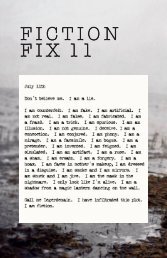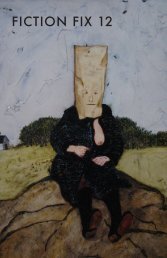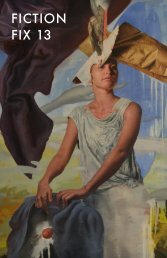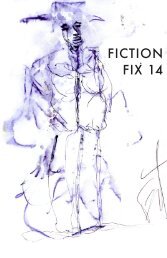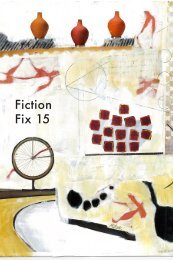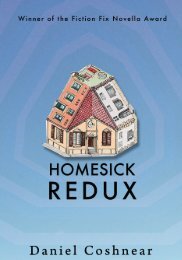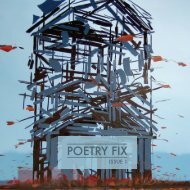You also want an ePaper? Increase the reach of your titles
YUMPU automatically turns print PDFs into web optimized ePapers that Google loves.
<strong>The</strong><br />
<strong>Sleeping</strong><br />
<strong>Wall</strong><br />
Jane M. Downs<br />
Winner of the<br />
Fiction Fix Novella Award
<strong>The</strong> <strong>Sleeping</strong> <strong>Wall</strong><br />
by<br />
Jane M. Downs<br />
Winner of the Fiction Fix Novella Award
“Jane M. Downs’ sentences refuse distance. <strong>The</strong>y slip under the skin. <strong>The</strong>y<br />
float in the blood stream and shiver in cartilage and the marrow of small<br />
bones. Reading them is a wondrous, trembly thing.” — Mark Ari<br />
<strong>The</strong> <strong>Sleeping</strong> <strong>Wall</strong><br />
Copyright © 2013 Jane M. Downs<br />
Typsetting and design by April Gray Wilder<br />
Edited by Mark Ari<br />
Editor-in-Chief<br />
Managing Editor<br />
Associate Editor<br />
Copyeditor<br />
April Gray Wilder<br />
Alex Pucher<br />
Blair Romain<br />
Sarah Cotchaleovitch<br />
Editors Emeriti<br />
Sarah Cotchaleovitch<br />
Melissa Milburn<br />
<strong>The</strong>lma Young<br />
Readers<br />
Sam Bilheimer, Brian Childers, Sarah Cotchaleovitch Krystal Davidowitz,<br />
Nicole Dominguez, Coe Douglas, Liz Flaisig, Caroline Fraley, Tim<br />
Gilmore, Laura Havice, Pam Hnyla, Laura Hyman, Kate Kaiser, Leslie<br />
Kaplan, Thomas Karst, Kris Knapp, Benjamin Liff, Robert McChargue,<br />
Melissa Milburn, Alexa Oliveras, Chrissy Rand, Sana Riaz, Heather<br />
Stafford, Brentley Stead, <strong>The</strong>lma Straight, Nicole Sundstrom, Christine<br />
Utz, Sam Wampler, Vanessa Wells, Phillip Wenturine, Travis Wildes,<br />
Hurley Winkler<br />
Fiction Fix<br />
www.fictionfix.net<br />
editor@fictionfix.net
Jane M. Downs<br />
I run along the wall, along the sleeping wall<br />
• 4 •
<strong>The</strong> <strong>Sleeping</strong> <strong>Wall</strong><br />
Part One<br />
—<br />
Open the door. Enter the house. <strong>The</strong> child defeated by sleep. Her arm falls free of the<br />
quilt. Her mother has brushed her hair and washed her feet. <strong>The</strong> gods yearn to be<br />
earthbound. <strong>The</strong> owl’s head spins on its neck. <strong>The</strong> mother sleeps. Her dreamed child<br />
remembered and unremembered. Yard of shivering birch. White dress breathless in<br />
its plastic bag.<br />
1<br />
—<br />
I sit at Mother’s piano, my young hands imitate her path over the keys. Like this, Medina, she’d<br />
say pointing to the correct key. <strong>The</strong> memory of her red fingernails against ivory. At her grave a<br />
wind arose from nowhere carrying the scent of tomatoes. I can smell bread baking in the oven. I<br />
am slowly growing hungry again.<br />
Medina watches snow fall on the tips of jonquils, fill the mouths of tulips. Dissolve on<br />
Huett Lake. She blows cigarette smoke out the window. She takes off her bracelets and<br />
sets them on the sill, notices the impressions left on her wrists.<br />
Huett Lake. Ramshackle summerhouse, sagging porches. Balsam breeze. <strong>The</strong> dock where I learn<br />
to dive. Mother kneels in the sand, scoops lake water in her hand. “Medina,” she says. “Taste the<br />
water.” And I lick water from her upturned palms.<br />
In the living room James will find Medina perched on the edge of the chair. Will see her<br />
bare legs and shining hair. And beyond the window, the garden powdered with snow, the<br />
lake. He will think that spring must wait a little longer.<br />
• 5 •
Jane M. Downs<br />
In spring, Father gathered iris in his arms. In autumn, he stood on the porch to follow the arc of<br />
apples falling, his hand a fan over eyes squinting into the yellow sun.<br />
James will pace the room, touch the lamp, her books. He will resist his need to touch her.<br />
He understands that when he speaks, the spell will shatter.<br />
At twelve I looked like Mother. “We’re like sisters,” she told the butcher. “Like sisters.” <strong>The</strong> meat<br />
case filled with red meats, a tray of pig snouts.<br />
<strong>The</strong> spring thaw woke James. He went to his sons, turned on the light. <strong>The</strong> one like him<br />
slept. <strong>The</strong> one like her lay on his back, awake. Turning his dark head toward his father he<br />
said, “It’s the ice breaking on the lake.”<br />
Mother’s closet stiff with recital dresses. Forgotten things linger in her pockets. After dinner, her<br />
music winds into us. We leave picked bones and bread crusts on our plates. How beautiful the<br />
china is when empty, scrubbed clean and shining.<br />
Medina thinks the snow is a forgetting, a cold hand on all that aches to rise. Earlier, she<br />
watched her youngest son race over the path leading to the lake, the dog at his legs.<br />
Mother runs the back of her hand over piano keys. What did she hear between the clicks of the<br />
metronome? See in the worn arms of chairs, in abandoned nests on porch eaves?<br />
On the sill, a nest with dog hair, a broken glider of thin wood, a loon’s egg. <strong>The</strong> jagged<br />
edge of daylight. <strong>The</strong> lake’s bleak depths. Snow, white on the windowpane.<br />
I am a twirling girl. A gyroscope-girl. I am the tap tap of my leather shoes wheeling under the<br />
glass chandelier. Elbows hinged, my arms open and snap shut over my chest. Braids whip my<br />
face.<br />
2<br />
My birth three years after Hiroshima. Perfume of April lilacs. Mother’s heartbeat. <strong>The</strong> damp<br />
earth stirs. White petunias like swatches of muslin on a bleaching field. My crib white against<br />
the nursery wall.<br />
Medina drives over gravel, her sons in the back. Rock music. Drumlins roll into forests.<br />
Spruce, maple, pine. Three blackbirds rise on oil-slick wings. She thinks her sons know<br />
nothing of love.<br />
• 6 •
<strong>The</strong> <strong>Sleeping</strong> <strong>Wall</strong><br />
When in motion, Mother loves me. Back and forth over the old Persian. Her words drop onto<br />
the rug for me to collect in my apron skirt. Clock chimes. Candlelight. I know no other world. I<br />
look into the mirror, squint until I am a string of yellow light.<br />
At dusk a nighthawk rushes over Huett, slash of white at her throat. <strong>The</strong> Old Town canoe<br />
rubs against the dock. <strong>The</strong> boys run from the moonlight.<br />
<strong>The</strong> hidden meadow. I run past the crumbling wall, through sunflowers, warm grass. I run.<br />
Until I know only the sweet smell, the whir of insects. Until I cannot breathe.<br />
She woke, paralyzed by a dream of a figure between her sons’ beds. She’d seen the shadow<br />
that covered its face. Like a hound beneath the moon, it thrust back its head. “Philip.<br />
Michael.” <strong>The</strong>ir names caught in her throat. Bulbs buried in earth. All the waiting flowers.<br />
“Tintinnabulation. Tintinnáre.” Mother says. “<strong>The</strong> notes of a triad are like bells.” She strikes the<br />
final note. I lean into the couch. Sound beats against my insides like a bell clapper. <strong>The</strong> furnace<br />
creaks and heat holds us.<br />
Medina winds the clock. Springs, wheels, weights engineered so that every hour a hammer<br />
strikes a chime. Tintinnáre. James’s shirt on a chair. She stares at the blank window. In<br />
the cupboard, wine, chocolate powder, sedatives.<br />
Father’s study. A cave of shadows and smoky scents. Book spines embossed with gilt lettering.<br />
His face lit by a single desk lamp. Milk chocolates for me in the bottom drawer beside his scotch.<br />
3<br />
“Here,” Mother says, taking my hand. We walk through the meadow. She points and says colt’s<br />
foot, shooting star, and I repeat the names. A swallow on a branch twitches its head.<br />
<strong>The</strong> night before Medina left for Huett, she grabbed James’s arms and wrapped them<br />
around her. Pressed her face into his neck, pulled his hand to her lips before he pushed<br />
her away.<br />
Wind tossed leaves against the boathouse. Late summer evenings on the porch swing between<br />
my parents. <strong>The</strong> stars are alive. <strong>The</strong> sounds of the lake and my parents’ breathing.<br />
<strong>The</strong> lake’s moods are a part of her. She can name fish that slip between twists of reeds,<br />
knows the loon mates for life, that its mysterious song brings rain.<br />
• 7 •
Jane M. Downs<br />
At Huett, I learn to braid my hair. I wash my feet and make rosehip tea. I run through birch on<br />
a dissolving path into a receding light.<br />
Light through birch trees. Michael’s voice skims the water. Philip lifts off the dock into<br />
a perfect dive. She remembers diving from the same dock, her body rinsed and clean.<br />
Sensations of flight.<br />
<strong>The</strong> lake rimmed in early frost. Father drapes an old sheet over the piano. I watch him secure<br />
the shutters. I don’t want to return to Syracuse and school. He smiles down at me, calls me his<br />
little lapling.<br />
She paddles the boys in the Old Town to the cove. An abandoned loon nest at shore’s<br />
edge. Michael wraps the broken egg in his red kerchief, holds it on his knees. She is alone<br />
with them.<br />
When they said Mother was dead, I didn’t cry. It was cold; that’s why she looked like snow. <strong>The</strong>y<br />
lowered her in the ground without air or sun. She wasn’t dead. In the grave, her mouth would<br />
open and sound pour out.<br />
James’s books open on the table. She doesn’t fool herself that he worries about her. It’s his<br />
sons he wants. With one tug, she rips the phone cord from the wall.<br />
4<br />
Sunday collection plates. <strong>The</strong> muted noise of coins dropped onto felt linings. Mother’s face lost<br />
behind her hat’s low brim. <strong>The</strong> bells of St. John’s swing back and forth. A child cries. I will be a<br />
mother who speaks sweetly to her child. I will rock her in Mother’s chair. I will play Brahms and<br />
other lullabies.<br />
Mother lifts her hand to her cheek. Sheen of pearls on her gloves. Her bracelet cascades down<br />
her arm, a collision of small sounds. We rise for the benediction. Again, the bells. I think I can<br />
never know anything.<br />
5<br />
Before dinner Mother cuts white roses. “We share a mind,” she says. She pricks her finger and<br />
laughs to see the red drop form.<br />
• 8 •
<strong>The</strong> <strong>Sleeping</strong> <strong>Wall</strong><br />
Summer rain. Swarming bees, a flying carpet of brown that bristles and dips over the lawn. A<br />
dark upwelling of dropping bodies.<br />
She smiles if I make a mistake and guides my finger to the correct key. Eyes like black glass. I<br />
lean my head against her shoulder.<br />
Father is late. Mother will play the piano when he enters, coat thrown over his arm. She will<br />
ignore him when he kisses the place on her neck beneath her chignon and whispers her name.<br />
Ignore the sound of ice cubes dropping into his glass.<br />
I am a girl who steps and turns a hundred times without getting dizzy. I am the vortex of my red<br />
skirt. <strong>The</strong> cut of red against white walls.<br />
In bed, I see myself through the wrong end of a telescope. My image gets smaller and smaller<br />
until I am a black spot in a tiny round lens. <strong>The</strong> dog scratches at my door. I do not blink or move<br />
a finger.<br />
6<br />
Lilacs everywhere and buds broken into green. Turn the corner, cross the street. Pass the low<br />
brick wall. <strong>The</strong> closer Medina gets to home the more she is lost.<br />
From the front steps, her mother’s music streams through the open window. Discordant and<br />
rude. Notes like broken words. Notes like the sounds of enraged birds.<br />
Up the stairs, past bookcases, cupboards, to her mother’s closet. She is smaller here, dwarfed by<br />
the satin gowns fluffed out with tissue paper, held in plastic bags.<br />
Music rises through floorboards. She opens the turquoise jewelry box. Each ring in its own slot.<br />
Earrings paired in rows. Charm bracelet coiled and still. Between the tiny harp and bell an<br />
empty loop.<br />
Her stomach hurts. She swallows bile, slides the bracelet into the toe of a black high-heeled shoe.<br />
<strong>The</strong> slammed bedroom door. La-la-la. Her mother sings the broken melody. Quiet as a lamb,<br />
Medina holds her breath until she thinks she will die. La-la-la. She prays for the Virgin’s voice<br />
to fill her.<br />
Through a crack in the door, she sees her mother’s feet in high heels pace and pace. <strong>The</strong> phone<br />
• 9 •
Jane M. Downs<br />
rings and rings. Her mother steps out of her shoes. Stockings, skirt, blouse, under clothes fall to<br />
floor. She sits on the bed, pours scotch into a glass, gulps it down, pours another.<br />
Mesmerized by her mother’s nakedness, skin almost white as the sheet.<br />
In the bathroom, water pours into the tub. La-la-la. Something taken from the medicine cabinet.<br />
Quiet, except for running water. As if the room swallowed something hollow.<br />
Water floods the carpet in long dark tongues that creep toward her. She moves through a liquid<br />
haze, her hands and knees sinking into the wet wool.<br />
Ladder of daylight through the blinds. She sees the shape of a snake on the wet carpet, a lamb.<br />
With each movement forward something peels away.<br />
A blade. Her mother’s head low in the water, arm outside the tub. On her hand, a red glove<br />
shines. Downstairs, the clock chimes five.<br />
7<br />
He knocks, sits on the empty bench. Cut iris in a crystal vase, sheets of music stacked on a table.<br />
He imagines his teacher in her blue dress, the row of buttons marching down her back. Without<br />
her, he plays scales.<br />
He is studying Beethoven’s Moonlight Sonata. He wants to make music match what he feels.<br />
Every Tuesday, lessons beside his teacher on the bench, intoxicated by the beauty of her hands,<br />
the wash of her music in which he can hear each separate note.<br />
Upstairs a child screams. He lifts his hands. She screams again.<br />
He finds her crouched on the bathroom floor. A skinny child, thin black braids trailing over a red<br />
sweater dotted with stars. Her face a replica of her mother’s.<br />
She clings to her mother’s arm. He pries her loose. She grabs at his face. He pins her arms, releases<br />
her. She shakes her head with such violence, he holds her face between his hands to still her.<br />
He carries her downstairs, her arms wrapped around his neck, legs around his waist like his<br />
eight-year-old sister does. “My name is James. Don’t be afraid.”<br />
He is shaking now. His voice breaks. And now he sees the hallway with the brass clock, the glass<br />
• 10 •
<strong>The</strong> <strong>Sleeping</strong> <strong>Wall</strong><br />
bowl beside the phone. Unlike his home, strewn with his sisters’ dolls and stacking blocks, and<br />
always the sound of childish laughter or tears.<br />
<strong>The</strong>y wait for the ambulance. He kneels and holds her hands. He thinks she is about twelve,<br />
older than he first thought. Her teeth chatter. He picks her up. <strong>The</strong> clock chimes once at a quarter<br />
past five.<br />
“James,” she whispers. Leaning back, she puts her hand over his mouth.<br />
8<br />
She spins through the airless house leaving a trail of rat-tat-tat. For months James still comes to<br />
practice every Tuesday. What time is it, Father? What time?<br />
James’s square nails against the ivory keys. His music a narcotic. Half asleep, she rests her head<br />
against his shoulder. Sleepy duets. Her left hand crosses over his right. It is silence that is the<br />
worst.<br />
Sky of geese. Trailers perched on double rows of brick. <strong>The</strong>y drive to his family outside Syracuse.<br />
Patches of turquoise sky spill through her. His blue-eyed sisters clap their chubby hands. And in<br />
the far meadow, pillars of bee hives.<br />
Her dark hair loose, they stroll through fields of bronze grass. He takes her hand. She is his little<br />
sister. His heart.<br />
Astonishing small candies wrapped in colored tin foil, all for her. He leans over the keyboard, the<br />
sonata a current that inhabits her. She touches her mouth at the opening chord. Steps dreamily<br />
over the Oriental rug. Step-turn-step-turn.<br />
With a flourish, he brushes snow from his uniform shoulders. Where is Fort Drum? Where is<br />
Vietnam? She watches him walk down the front steps. <strong>The</strong> yard, the street, lost to white. <strong>The</strong><br />
moon, a bone buried in sky.<br />
At his house she saw a roan horse. Saw the tremor of its flank, the red rim of its eye.<br />
• 11 •
Jane M. Downs<br />
9<br />
<strong>The</strong> quiet library. Dusty smell of books. Just like Father’s study. From the window, I see Roundy<br />
Hall and the dormitory with its skittish sounds of girls living together. Here, the world is still.<br />
Only dust spins crazy in autumn light.<br />
Skirts must touch the floor when we kneel. We hold our books tight to our chests, sneak cigarettes<br />
behind the library.<br />
<strong>The</strong> sunlight on the dorm also shines on our house in Syracuse. Father speaks without looking at<br />
me. Once, he touched my hair and called me Mother’s name.<br />
<strong>The</strong>re are chapel bells here. <strong>The</strong>y ring at 8:00 AM, noon, before dinner. At home, the bells of St.<br />
John’s announce lauds, sext, and vespers. Tintinnáre. Mother’s bracelet under my pillow. <strong>The</strong><br />
tiny bell. <strong>The</strong> harp. <strong>The</strong> cross. Collision of charms. Gold, cool as the spiral of pearls in the jewelry<br />
box.<br />
“It is the mystery of music that compels,” Mother said. “<strong>The</strong> arrangement of notes makes temporary<br />
sense out of chaos. Yet it is mystery combined with order that enchants.”<br />
I watched her carve a jack-o-lantern. She was always careful with her hands slicing vegetables<br />
and meat. She wore white gloves to cut roses. White, the color of nothing.<br />
• 12 •
<strong>The</strong> <strong>Sleeping</strong> <strong>Wall</strong><br />
• 13 •
Jane M. Downs<br />
Pa r t Tw o<br />
Look, how beautiful from above, each bomb a flower of smoke.<br />
Look, the molten river streaming, houses paper stars in flames.<br />
—<br />
1<br />
—<br />
White lilies, tea cups lined up on a ledge. In Saigon, James eats bun cha. Nocturnal packs<br />
of dogs, each resembling the other. Night-children sleepily awake while others dream in<br />
beds as soldiers crowd through streets outside their doors.<br />
A Vietnamese child, four or five, beside her elder brother. Hair like charred wood, her<br />
eyes a mineral blue. He follows them to rubble piles sprouting behind buildings. Human<br />
figures scrounging under lamplight. Broken glass, rain-glazed metal. <strong>The</strong> child squats,<br />
making herself into a teetering bowl. Her brother slaps the knuckled hands of old men,<br />
pushes past women, arms bound with rags.<br />
James makes offerings of sliced beef, tea, cakes of rice. Creatures of stealth. She slips out<br />
of shadow, opens her hand, then backs away to hide behind her brother. Even at night,<br />
insects gather at the food.<br />
He follows them deep into the city. <strong>The</strong>y scurry like rats. Blind man’s cane tapping. American<br />
music beats through a window to mix with strains of a violin from another. Thin<br />
arms, her drab dress almost white in streetlight; they stop to eat what he has given them.<br />
She skips around the lamp post. Her brother holds an object gleaned from rubbish to<br />
light. Opening his mouth, he sings words James cannot know. Human sound fills James.<br />
An inner harmony he’d once felt as he sat beside his piano teacher, her daughter hiding<br />
somewhere in the house.<br />
• 14 •
<strong>The</strong> <strong>Sleeping</strong> <strong>Wall</strong><br />
2<br />
An old mama-san, her bowl of dust. A boy’s empty tin cup.<br />
James at the kitchen table since lunch. He will not drink his milk. He is eleven. Window of white<br />
lace. Whine of jet descending into Fort Bragg. One of the House Rules: Waste Not, Want Not.<br />
Crates of C rations. James guards the truck, gun across his chest. <strong>The</strong> Lieutenant tosses<br />
cans into the swarm of bodies. Beans. Peaches. Applesauce. <strong>The</strong> crowd tears at each other<br />
for the food. Pears. Spam. Pudding.<br />
He will not drink his milk. He is a crusading king waiting for his foot soldier to test for poison.<br />
He reconstructs WWII battles memorized from his father’s books. He will not drink.<br />
Jack Sprat could eat no fat, his little sister sings through the window. She chases her twin across<br />
the lawn, collapses with laughter beside her. <strong>The</strong>y cover their dolls with dishtowels, sing them to<br />
sleep. <strong>The</strong>y bend their heads, hair falling over their cheeks.<br />
<strong>The</strong> crowd chases the truck. Sores on their arms, at the edges of their mouths. Hands grab<br />
onto the tailgate so hard, fingers break.<br />
Roar of his father’s ’57 Olds. His mother pours the milk down the drain. Shoulder blades like<br />
axes under her cotton dress. Commander Sgt. Major. Car keys crash on counter. Kiss on her<br />
cheek. Highball. He nods at his son. Gives him a slap on the back of the head.<br />
3<br />
His father brews coffee, inspects their rifles. <strong>The</strong>y step into the cold, cross the pasture under an<br />
opening sky. James has forgotten his gloves. His fingers ache with cold, his rifle a tube of ice. Grey<br />
dawn.<br />
Geese overhead. <strong>The</strong> sky filled with them. Wing spans the size of a child. <strong>The</strong>y fly in a V formation<br />
like B-29 Liberators.<br />
<strong>The</strong> summer before, he ran across the pasture to the pond. A deer fled into the underbrush. That<br />
was when he was a child without a rifle. This year, he will be the one to bag the deer.<br />
<strong>The</strong>y rest their rifles against the crumbling rubble wall. His father kneels to tie a bootlace, looks<br />
up at him in easy camaraderie. James shoves his hands under his armpits. He wants to jump<br />
• 15 •
Jane M. Downs<br />
up and down. He has his own rifle. He wants to yell, to hear his voice vibrate through the lifting<br />
haze. He stamps his feet. A few stones tumble down the wall. One hits the trigger of his rifle. A<br />
shot tears through the silent woods into his father’s arm.<br />
4<br />
His mother plays Beethoven on the stereo. His sisters rest their heads in her lap. He reads his<br />
father’s history books. Stories of heroism, defeat, victory. Hands joined to text, he takes in what<br />
was once in his father’s mind. In his closet, the German helmet, medals, a brass belt buckle.<br />
<strong>The</strong> horses rub against the fence. <strong>The</strong>ir muscles twitch without their knowing. <strong>The</strong>y nuzzle sugar,<br />
their lips a whisper in his palm. <strong>The</strong>ir muffled sounds at night.<br />
Light steals over the piano hood. It has always been there, waiting. Lessons in town with the<br />
beautiful teacher. <strong>The</strong> quiet of her home. Mechanics of string, pedals, hands. Notes march across<br />
the page, the mystery underneath.<br />
He plays for his sisters. Music floods into him. It obliterates the sound of the shot reverberating<br />
through the woodland. His memory of abandoning his father and running to the pond. Birds<br />
calling. Cold sun. He held his breath, sat on his hands, waiting for someone to find him.<br />
<strong>The</strong> way the horses pace. He wraps his arms around their necks. <strong>The</strong>ir pleasing animal odor.<br />
5<br />
James wakes to the gathered quiet of dawn. His stack of books, the orderly row of lead soldiers<br />
on his desk. <strong>The</strong> walls of his room. Safety. A place his father is not.<br />
Each day he hears the gunshot ring. His father doesn’t touch him anymore.<br />
Water runs through the pipes. Footsteps heavy in the hall. His father bangs on his door, telling<br />
him to get up. Silence breaks. Steam rises from dishwater. His mother’s cheeks flushed; her red<br />
hands.<br />
After school, his mother plays her records. James at the corner desk. Clock ticking beneath a<br />
picture of a hunting scene. Music mingles with the words he reads. Analyze, memorize until the<br />
mind is drained and contentment comes. His failures buried beneath facts, theories, images—<br />
musical notes that circle around him.<br />
• 16 •
<strong>The</strong> <strong>Sleeping</strong> <strong>Wall</strong><br />
In the picture, horses leap over hedges. Red coats, riding crops, black boots. A fox runs ahead of<br />
the hounds. As a small child, the scene terrified him. His father teased him for his timidity. But<br />
it wasn’t fear for the fox that frightened him. It was his recognition that the fox knew he was<br />
running for his life.<br />
His sisters build houses with cards, then knock them down. <strong>The</strong>y whisper to each other.<br />
6<br />
James is no longer separate. He is one of a stream of green uniforms flowing from the<br />
jungle into an open field. A soldier inches forward, leaning his weight on a crooked tree<br />
limb. Others limp and twitch, sleepwalkers yanked from the shadows of the jungle like<br />
marionettes. <strong>The</strong> lifting of feet, the turning heads controlled by invisible hands. Grasses<br />
trodden.<br />
<strong>The</strong>y burned the village. Cluster of houses, chickens, dogs. Old women and men<br />
hiding. Children with bound mouths. Vines of burnt flowers.<br />
<strong>The</strong> field fills with men until it seems the jungle cannot release more, but they keep coming,<br />
some weeping, a few carried on dirty cloth stretchers. Odors of sweat and dried<br />
blood cling to him.<br />
An ambush avenged. A child’s head wrenched sideways.<br />
A gray sun starts its descent. Rain falls straight down between the men. Between saplings<br />
that rise straight up out of the earth and blades of thin grass. A warm rain that draws fine<br />
black lines against the sky and slips between the wooden men with their wooden faces.<br />
You can almost hear the small clicking sounds of teeth chattering in empty mouths. <strong>The</strong>ir<br />
eyes seem painted on their faces, their pupils black pinholes. <strong>The</strong>y don’t look left or right,<br />
but down at the ground.<br />
Night sweats. Lotus dreams. Scorched earth. Red dusk.<br />
He has left the jungle and cannot return.<br />
• 17 •
Jane M. Downs<br />
7<br />
James sees Medina in the coltish movements of young party girls of Saigon. <strong>The</strong>y have no<br />
breasts. <strong>The</strong>y dart from soldier to soldier, grab at their shirts. He sees her in their obsidian<br />
eyes, narrow feet in plastic sandals and legs streaked with fine dried dust.<br />
Velvet skin, a hungry mouth can obliterate ruin. Perfume masks air drenched with the<br />
sweat of soldiers crammed into tents. <strong>The</strong> last night the prostitute is as small as a child.<br />
Her saliva tastes of vinegar. Her red nightgown trails along the floor. He leaves accidental<br />
bruises on her arms.<br />
• 18 •
<strong>The</strong> <strong>Sleeping</strong> <strong>Wall</strong><br />
• 19 •
Jane M. Downs<br />
Part Three<br />
—<br />
<strong>The</strong> child’s paper boat on the lake. Her mother beside her. <strong>The</strong> boat grows heavy<br />
with water and stops. <strong>The</strong> child prays it will stay afloat, even though she knows it<br />
won’t. If you hold a shell to your ears you can hear waves. If you hold your hands over<br />
your ears you hear your own heart beat. <strong>The</strong> boat collapses. If she listens hard enough<br />
she can hear her mother’s thoughts. <strong>The</strong> way her mind grinds out words.<br />
1<br />
—<br />
James’s eyes are blue. <strong>The</strong> hard blue of diamonds, the blue of ice. He touches Medina<br />
and the ice melts in her hand. He holds the hair back from her face. She didn’t know how<br />
empty she’d been.<br />
She leads him to the far shore. White birch like the long spines of the dead. Stone wall.<br />
<strong>The</strong> shed damaged so long ago by fire. His hands all over her face. It is through her flesh<br />
that her heart is pierced. He could kill her and leave her there.<br />
He whisks the sheet from her mother’s piano and laughs to hear her play so out of tune.<br />
<strong>The</strong>y pick blueberries that she eats from his hand. All those empty upstairs rooms. He<br />
says his sisters grew up while he was away. He says she has grown into her mother.<br />
Bouquet of wild flowers, red wine, his college text he reads aloud. He plays Satie with<br />
the hands of a somnambulist. She dances for him with languid, silky movements. “Come<br />
here,” he says. His mouth open against hers. His hand burns her thigh. Afterwards, he<br />
sweats as if he made love in a vortex of fire. <strong>The</strong>y are yoked by flames. “Do you love me?<br />
Do you?”<br />
• 20 •
<strong>The</strong> <strong>Sleeping</strong> <strong>Wall</strong><br />
He tries to describe the stench of Saigon pyres. Blackened faces of children. “Hush.” She<br />
puts her finger to his lips.<br />
2<br />
Pain. Wave after wave. Breathe. One, the midwife counts. Chipped white paint on the iron<br />
bedstead. Two. Was that lightning outside? Three. James holds your ankles. Four. You are<br />
opening. You are splitting. Breathe. <strong>The</strong> midwife counts. You count.<br />
Pain twists. Explodes. <strong>The</strong> midwife opens her black bag with scissor hands. You bear<br />
down and down. <strong>The</strong> child cuts through you. You are tearing open. You scream. You are<br />
all body. <strong>The</strong> slippery cord. An angry cry. <strong>The</strong> child in James’s hands. He smiles into his<br />
son’s face, throws back his head and laughs. He kisses your forehead, your mouth.<br />
Child on your breast mewing like a kitten. You guide his rooting mouth to taste your foremilk.<br />
Warm weight. Genitals so large it seems he sprang from them. His blue eyes. You are<br />
thinning out. It is too soon to feel love. You dig your nails into James’s hand.<br />
He wraps the afterbirth in newsprint. You see him through the window, hear sounds of<br />
digging. Afterbirth buried under the old pine. <strong>The</strong> lake beyond, three-quarter moon rising.<br />
Sun falling behind the far shore hills. One last shock of blinding light. It races across<br />
the water. Shoots through the tree to glaze your arm.<br />
3<br />
<strong>The</strong> one like her born at dawn. Shadows gathered in his hair.<br />
Birth. <strong>The</strong> moment is an eggshell cracking open. It all races at her. <strong>The</strong> small wet head, the<br />
stub of cord. <strong>The</strong> scraping sheet. <strong>The</strong>re is no stoppage, as if she had no skin or will. As if it<br />
all could drown her. Blood glistens, smears the inside of her thighs, its scent so strong she<br />
gags. She turns into the pillow.<br />
James at her side, the child between them. “Michael,” he whispers, his breath in her hair.<br />
He traces a tear that falls down her cheek.<br />
<strong>The</strong> child’s small hand around her finger. She brings it to her mouth. Her body emptied.<br />
Her breasts ache. Outside the rain like many knives. Leaves cut from their hold.<br />
• 21 •
Jane M. Downs<br />
4<br />
<strong>The</strong>ir world at Huett. Blue flowers in September. Dawn against a dusty window. Sometimes,<br />
she disappears into the trees. His classes at college. Dizzy. Bereft. Words pulse with<br />
history’s stories of catastrophe, love, blindness. <strong>The</strong> meadow crossed. <strong>The</strong> broken wall.<br />
<strong>The</strong>y watch constellations open over the lake.<br />
He saw the soldier race across the field, head down, feet barely touching the ground. Someone<br />
shot him in mid-flight and then they were all around him, stripping his body down to the injured<br />
flesh.<br />
It is the dream of Medina that captures him. <strong>The</strong> cadence of her thought, her pulse, the<br />
metronome that was her mother’s. He is lost in her body. She wraps him in her hair.<br />
Jungle dripping with heat. Vines coiled between branches. He kneels over the corpse. Hears the<br />
jungle behind him as if it were thinking, trying to speak.<br />
Scorched village. <strong>The</strong>y dig where the huts were. Broken dishes, pots, a doll, a wooden horse.<br />
Bones. <strong>The</strong> closer they get to the bones the more they swear and joke. One puts on a helmet<br />
encrusted with blood.<br />
She collects feathers. Dead bees in a bowl. An empty mud wasp nest. Presses leaves between<br />
sheets of waxed paper. He watches her move beneath the burning autumn sky.<br />
Memory, a movie playing frame by frame.<br />
Broken Buddha on a fence post. A cross hung around a neck. Soldier praying inside a foxhole. A<br />
woman kneels to kiss the ground. Thunder. A couple makes love after a funeral.<br />
5<br />
Now, he can’t stop remembering the mud and rain, everything suspended in dense light.<br />
<strong>The</strong> scorching Vietnam sun. No wind. Rows of body bags, temporary graves. How he<br />
held a cigarette to the lips of a soldier without hands. Now, he has a quiet place where he<br />
can reach into his books for answers. A place where it is possible to imagine a future. Yet,<br />
watching his sons run along the path to the lake, Medina behind them, her hair a shower<br />
of black, he wonders what they are running to.<br />
Always restlessness, always the need to ease it. How lovely her eyes are at dusk. And the<br />
children’s, too. Ice cubes gleaming in a glass. Gin cool in his mouth.<br />
• 22 •
<strong>The</strong> <strong>Sleeping</strong> <strong>Wall</strong><br />
6<br />
Winter lake. Snow. Glint of blades. Philip skates ahead. Michael’s mittened hands. <strong>The</strong>y<br />
are currents swept to where sleeping ducks slip their heads beneath wings on summer<br />
nights. Where fish spawn transparent eggs.<br />
Minds overtaken by bodies, they push forward without thought of what will one day end.<br />
Snow on the bell tower of grinding wheels. Ice, pink in morning light.<br />
7<br />
A rusty laundry carousel. Broken clothes pins on a gray rope. She watches her sons run<br />
against the wind, shirts flattened against their chests. With a thud, Philip kicks the ball. It<br />
rises and they chase it, stomping over packed sand, hands swiping the hair blowing across<br />
their foreheads. She bites down hard on her cigarette filter. A robin breaks free from a tree.<br />
8<br />
Wreckage of a winter intruder. Overflowing ashtrays, hearth littered with beer bottle<br />
glass. Blood trail to cellar, delicate and brown. <strong>The</strong>y find a deer on its side. She retrieves<br />
the hacksaw from the boathouse. Philip watches James from the stairs, hands over his<br />
mouth.<br />
She stands on the dock with Michael. James and Philip paddle the Old Town to the center<br />
of the lake. Bags of deer slide overboard. Pelvis, shank, rib. It was a doe, her eyes gone to<br />
milk.<br />
Precise reflection of birch and spruce. Her mother played scales, a slope of notes that<br />
rushed at her through trees. A loon glides in the cove, its cry stilled in the curve of its neck.<br />
That night she will let him hurt her. He will sink his teeth into her shoulder as his life spills<br />
into her. He will find the hard knot of her nipple and suckle like an infant, his own death<br />
something not yet a possibility.<br />
9<br />
Medina and James make quick, hard love. It is impossible to rid her body’s need of him.<br />
• 23 •
Jane M. Downs<br />
I wind my music box. Inside the glass, a ballerina wheels around to carousel music, her tutu a<br />
stiff pink cloud. Her tiny perfect arm curves upward. One leg forever bends behind her. <strong>The</strong> key<br />
turns. I never let it stop.<br />
Her eyes close and it all vanishes. She must not forget anything.<br />
Cream-white paper stacked on Father’s mahogany desk. On the chair his sweater exhales dark<br />
scents of cigar and roasted meat. A photograph taken the day he left for Europe, before his<br />
ruined leg. Tall and crisp in his army uniform, Mother’s tailored white suit. Behind them, bare<br />
trees against winter sky.<br />
<strong>The</strong>ir sons are animal-like in their investigations. <strong>The</strong>y love the things they trap and keep<br />
in jars. White-bellied spiders. Small cocoons. Fireflies that beat against the glass.<br />
Inside the silver frame, Father’s wide smile, the jaunty slant of hat. Mother lifts her face to gaze<br />
into his eyes. His arm protects her. His eyes adore her. <strong>The</strong> carousel music slows. I turn the key.<br />
Yellow moon. Summer ends. Fields and orchards wait to be relieved. She hears a raccoon<br />
screech. Rain gurgles in the gutters.<br />
<strong>The</strong> rat-tat-tat of mother’s heels. Hands flutter, charms clatter. She lifts the piano hood. Her<br />
music sings inside me, and my heart races. Her music holds me, and I am inside it.<br />
10<br />
On the mantle a photograph. Philip beside her on the dock. Michael on her hip. <strong>The</strong> lake<br />
a shining disk between sky and earth. She missed the moment of her perfection, but the<br />
camera paid attention. <strong>The</strong> shutter opened and shut. Her image caught in the dark chamber.<br />
11<br />
A sea, a swarm, all the world a single mass in motion. She tries to slow it. She smokes. She<br />
drinks. She counts the clock’s chimes.<br />
She walks in the meadow where rain has bred yellow hawkweed and wild iris. Michael<br />
runs to her; a feather floats in his hand.<br />
• 24 •
<strong>The</strong> <strong>Sleeping</strong> <strong>Wall</strong><br />
James plays the piano. Sounds shiver across the water. Philip at the lake’s edge in his<br />
striped soccer shirt. His stone skims effortlessly over the water before it drops.<br />
<strong>The</strong> curve of James’s shoulders fills her with such longing. That first year, she went without<br />
underwear so he could have her whenever he wanted. Against the wall. On the porch<br />
floor.<br />
His music rushes at her. A flock of birds startled from the birch. A furious sheet of rain.<br />
She grabs hold of her chair, as if the flood would lift her. <strong>The</strong> play of hammer and string.<br />
<strong>The</strong> balance of melody against everything else.<br />
And they are all caught up in the resonance—as if there was no other world outside of it,<br />
only the lake and the gathering smell of rain.<br />
<strong>The</strong> canoe. <strong>The</strong> lake a mouth. She was careless with what she loved. It was always too<br />
much. Wild geese always calling, cupboards needing to be filled. <strong>The</strong> children watch the<br />
metallic clouds move above the lake. <strong>The</strong> water turns black.<br />
• 25 •
Jane M. Downs<br />
Part Four<br />
—<br />
<strong>The</strong> child wakes. <strong>The</strong> mobile over her crib. Little white lambs circle with nowhere<br />
to go. Round and round. Hypnotic. <strong>The</strong> door creaks open. She’s figured<br />
this out—door opens and she will be touched. Right now, she knows only the<br />
hands of her mother, her father. Gentle hands. Right now it is magic opening.<br />
All of it.<br />
1<br />
—<br />
James is late for his class. Mai is without an umbrella. He holds the door. She brushes<br />
against him. Rain beads on blue-black hair.<br />
Medina at the edge of his vision. Spinning woman. Spinning world. Bracelets clatter.<br />
Scented lipstick. His sons run across the meadow, shirts flapping like flags in wind.<br />
Mai in the front row. He hands out the syllabus. Her feet are wet. He starts with Hegel.<br />
She takes notes in a small black notebook.<br />
Her back toward the house, Medina sits for hours at the dock end. Lost in a book. Lost in<br />
a dream. Lost to them all. <strong>The</strong> boys in an attic room devising codes. Whittling with their<br />
new knives. She calls their names; her voice melts into the lake.<br />
Yes, I was in Saigon. We lived on rue des Lille. <strong>The</strong>y destroyed me then they saved me.<br />
Empty wine bottles. Medina’s mark on everything. Hair like ravens. He catches her arm.<br />
She spins away. <strong>The</strong>y paddle the Old Town to the far shore. She takes him into her. Open<br />
me. Make me feel. Make me feel.<br />
• 26 •
<strong>The</strong> <strong>Sleeping</strong> <strong>Wall</strong><br />
Mai makes him tea in her celadon teapot. Gibbous moon. She feeds him almonds. A plate<br />
of oranges. Waning crescent moon. She is obsessed with hummingbirds.<br />
One night a syzygy. Moon, earth, sun clumsily aligned.<br />
2<br />
James’s desire for Mai stuns him. Her clipped, precise English, handwriting careful as a<br />
schoolgirl’s. Caught in window sun, she seems a chrysalis encased in light. When she<br />
walked into his classroom he hadn’t known an instant could transform him so completely.<br />
Again and again, he goes to her as if in a dream where he is without will. Her room holds<br />
such stillness—a boat adrift in the middle of a lake. Air tinged with the closed-up scent of<br />
secondhand books that line her walls. Her soft hands clutch the sheet. Before he leaves,<br />
she tiptoes to press her lips against his eyelids.<br />
3<br />
Mai’s world lost piece by piece. <strong>The</strong>re is a rhythm to the losing. <strong>The</strong> way purple herons lift and<br />
lower their heads, their spindle legs vanishing in tall grass.<br />
Saigon, city of bones, rises in smoke. <strong>The</strong> sky bends down to meet it. <strong>The</strong> stripping away until<br />
things reveal themselves as without weight. Without roots.<br />
<strong>The</strong> Mekong is a molten river, bridges fingers of flame. She watches her mother bury the polished<br />
Buddha under bamboo leaves. She feels a sudden pain, her heart fighting against its own death.<br />
<strong>The</strong> darkness is a ruin. Her mother’s hand, twigs of bone in hers. More refugees, tense links in a<br />
chain of bobbing lights. Footprints dissolve as if in sand.<br />
Boatmen lean against lampposts smoking. Those who would try to break her open. Rough and<br />
careless, not like she imagined her father in his French army uniform. She pieced him together<br />
from a torn image in black and white. He visits her dreams offering oval pebbles piled in a rice<br />
bowl. He left her his name, left her his language ma fille, mon amour.<br />
Boats, ribbed cradles anchored in red morning. She stares at the lapping water, vessels battered<br />
by the sea. Her teenage body. She lifts her chin, straightens her spine and faces the eastern glare.<br />
• 27 •
Jane M. Downs<br />
Her mother unbraids her hair, combs it with her fingers. Her mother sighs. Wind howls through<br />
their ribs.<br />
4<br />
Always, something simple arouses him. Strand of hair across Mai’s cheek, curve of ear<br />
lobe. He pushes up against what at first seems impenetrable. Kisses her eyes, peels away<br />
her clothing. She opens under his hands, admits him to her very center.<br />
Black storm. We crowd under the tarp. Maman shivers and I rub her arms. Rain like bullets.<br />
Swell after swell, the boat listing, us listing with it. Nothing connects to anything on the sea. <strong>The</strong><br />
endless sea.<br />
Bodies joined, he feels her yield, imagines an emptiness, into which he will pour himself.<br />
Her center a vast hollow where thought and memory perish. All is acquiescence. He is<br />
hostage to this simple truth.<br />
Maman smells of fever, her thirst inhuman. We huddle together. I recite poetry memorized in<br />
school. Words I thought I’d forgotten speak themselves through me to maman.<br />
Pour inviter les oiseaux du reve au chevet.<br />
He bathes her, sponges between her small toes. Her scars intrigue him. He traces the long<br />
glossy one that trails over her arm. Studies the splatter of white pinpoints on her skin.<br />
“Speak in my tongue, Mai,” Maman says, her voice almost lost.<br />
may theo chim ve day nui xa xanh tung.<br />
Here is where they stitched me. Here is where the shrapnel was extracted.<br />
I rub Maman’s feet, press her head against my chest. Others pull her away. She slides into the<br />
ocean. I see the rain is made of tears. <strong>The</strong> outlines of a great bird rise inside the storm. Wings<br />
shudder open and close. It holds my life in its talons, my words in its beak.<br />
He folds her in her robe, reads a lesson while she rests in his arms. Searches her eyes for<br />
signs of resistance, his face twinned in the dark pools.<br />
Buddhists burn their dead, release the ashes into wind. <strong>The</strong> dead never go away. <strong>The</strong> dead are<br />
everywhere.<br />
• 28 •
<strong>The</strong> <strong>Sleeping</strong> <strong>Wall</strong><br />
She is tired. She listens to him close the door. From Saigon, to the Philippines, L.A., New<br />
York. No one left to run to. She accepts this place of spruce and snow. Birch like mist<br />
twisting up from rice fields. She is grateful for her scholarship. For this man with ice-blue<br />
eyes who tries to heal them both with his hands.<br />
5<br />
Medina accuses James of not loving her. Of trying to hurt her. Her flushed face. Her<br />
mouth stretched tight, stained with wine.<br />
He can’t tell her of Mai, who writes poems in black notebooks. That he is overwhelmed<br />
by a submission to all he had buried after the war.<br />
She accuses him of not loving her. Of avoiding her. He begins to pace. She grabs his arm.<br />
“Stop. Look at me. Touch me.” Her elbow sends a glass crashing to the floor.<br />
He can’t tell her he is unraveling thread by thread. Of Mai whose body gives reprieve.<br />
Whose room holds a brass Buddha polished by candle light.<br />
He leads her to the piano, covers her hands with his own. Directs them to play familiar<br />
patterns. She softens beside him. She weeps. He kisses her mouth.<br />
“You are my life. Our sons are my life.” Lying beside her, he strokes her. She comes in long<br />
waves. She cries out. He holds his hand against her mouth. He knows he is falling away. It<br />
is the vanishing that betrays her.<br />
6<br />
Silhouette of birch. Early birdsong. A child’s fort built of branches and leaves. Children’s<br />
footprints in the sandy grass. Medina wraps herself in her wool shawl, watches her sons<br />
fight with sticks thin as switches. “En garde.” Philip advances. Michael retreats. Hiss of<br />
sticks. <strong>The</strong> dog jumps and snaps. Imagined wounds.<br />
She holds out her hand for their weapons. Philip throws his at her feet, salutes and turns<br />
away. She does not see the child, only his anger. She grabs his arm. He wrenches loose to<br />
disappear into the fort, a house too fragile to hold him.<br />
• 29 •
Jane M. Downs<br />
7<br />
Mai is ravenous. He feeds her books. Nietzsche, Hume, Freud underlined and full of marginalia.<br />
He drinks gin he keeps in her cupboard. Argues truth is philosophical, that artists<br />
are the architects of cultural heritage. He sees death everywhere, says we create artifice in<br />
order to not be swallowed by it.<br />
He speaks of his family as if they are from another century, his sons not marked by his<br />
own fate. Mai knows he will never leave them. His sons are mirrors. He talks of walking<br />
with his wife in fields beyond his family home before the war.<br />
She takes what he can give. Above all things, she is practical. That is enough for now.<br />
He speaks of Vietnam; she listens. He holds his head between his hands. He cannot stop<br />
himself from talking. He paces her room, tapping his fingers on every surface.<br />
She chooses images: Saigon’s boulevards clogged with cars and bicycles. Whirl of saffron<br />
robes, girls teetering on gold lame shoes. Markets where shackled chickens squawk and<br />
plumed birds dart from perch to perch in bamboo cages. She inhales incense, jasmine, human<br />
excrement and sweat. Every hour the sound of church bells wash alleys and rooftops<br />
clean.<br />
<strong>The</strong> nuns cried when they kissed her goodbye. She sees herself, neat in her navy blue<br />
school uniform, her pigtail straight down her back, her dreams inside her like fragile glass.<br />
<strong>The</strong> war. Funnel of wind. Horizon of flames. Children open empty hands. Sun on a face,<br />
then blood.<br />
Later, he pounds his body into hers. She craves the harshness of it. As if her listening<br />
deserves punishment, her acquiescence penance for her survival when so many died. She<br />
knows he will bathe and stroke her. He will cradle her and, for a while, she will be all body.<br />
He will leave her books to set on shelves she made from cinder blocks and plywood.<br />
Her name on his lips, his voice inside her. She hoards his words for poems she writes in<br />
black notebooks with blue-lined paper. Vietnamese, French, English. At times, she thinks<br />
she will become deranged by words. Each new language a transparent skin pulled tight<br />
over the skeletons of the others. Each new poem something ripped from both of them.<br />
• 30 •
<strong>The</strong> <strong>Sleeping</strong> <strong>Wall</strong><br />
Long hours bent over books in her rented room the size of the one she’d shared with<br />
Maman. She heats up tom yum soup, imagining Maman reading in the corner, her book<br />
lit by a kerosene lamp. Mai writes.<br />
• 31 •
Jane M. Downs<br />
Part Five<br />
—<br />
<strong>The</strong> child’s room is a box. Three dolls akimbo on the sill. Door without a lock. She<br />
pleats their skirts and combs their hair. Wraps lace around their wrists. She is the<br />
maker of dreams. She is the taker of dreams. She is the guardian of lost dolls.<br />
1<br />
—<br />
Milk poured into little pitchers, then set on the table. Vine bent along the fence, twig on<br />
the back step. Shoes piled in the hallway. A horse fly has bitten Michael’s arms. Medina<br />
opens a book. Mold splatters the pages.<br />
Noon sunshine. Nowhere to hide. <strong>The</strong> boys doze in the rope web of the porch hammock.<br />
She lines up their shoes. Pours water into potted geraniums. Blue sky falling through<br />
branches. <strong>The</strong> Old Town needs varnish. Unmade beds wait.<br />
She thinks she is trapped in a story. How can she know what she thinks? Behind pale blue<br />
eyelids, Michael’s eyes roll into his head. He seems abnormal, alien.<br />
Last night, she and James lay in bed not touching or speaking, knowing the other awake,<br />
the silence between them thick gauze. She said his name. <strong>The</strong> clock’s chimes surged<br />
through her. Molten silver. Tintinnáre.<br />
A hawk flies over Huett. Its cry rolls over the water, fades into the horizon. Her thoughts<br />
shift like light on waves. She longs for winter’s breath on her face. Stillness of snow. Sound<br />
of ice on leaves, reeds glimmering swords.<br />
• 32 •
<strong>The</strong> <strong>Sleeping</strong> <strong>Wall</strong><br />
She rocks the hammock. Philip’s eyes snap open. A black bird crows, then another and<br />
another until the tree screams.<br />
2<br />
A glass of milk slides through Michael’s hands. Shattered glass in a pool of white.<br />
James had said, We make our own history. We make choices. She pulls his shirt around<br />
her, slides his hunting knife into her jeans.<br />
Mother’s hands come down hard on ivory keys. Eyes closed, she leans into the piano. I sink into<br />
my chair, mouth words to made-up songs. Chair, piano, even Mother, are made of sound. Things<br />
I can put my hand through.<br />
Drawers of mismatched silverware, unused marrow spoons. She grabs a corkscrew. <strong>The</strong><br />
foil over the bottle top slices her finger. Blood on a plate. Blood on his shirt. Tap water of<br />
rust. Her bracelets clang against porcelain. Spring snow falls through birch. Snow melts<br />
into the lake.<br />
Cattails and lily pads. I float, my unbound hair flowing around me. I dive to the bottom in<br />
search of fronds in the dim green. I dive to where light fades and my fingers turn cold. Even here,<br />
the current a kind of music.<br />
Window fogged by steam. Hot dog water thick with fleshy scum. Philip’s eyes the sharp<br />
tips of daggers. Michael’s rabbity bites. Red wine hot in her throat. With the tip of her<br />
cigarette she lights another. Pour another glass. Another glass.<br />
Mother’s eyes veined yellow by lamplight, my face between her hands. Music records history, she<br />
says; you learn what was forbidden, for that is where the music comes from. A wisp of hair floats<br />
over her forehead. I dare not touch it.<br />
Bitter wine. Sunset. No wind. With snow, a sudden chill as if the day’s heat was an accident.<br />
She runs to the boathouse, trails her hand over the Old Town’s wooden gunnels.<br />
She looks at her hands, broken lifelines on both palms.<br />
3<br />
At the window she sees headlights, but it is the last of daylight clinging to birch. Her hand<br />
• 33 •
Jane M. Downs<br />
flat against the window. Her wine tastes ripe, dark. Dusk. Stars nailed to sky.<br />
His absence carves a pit into her stomach. She fills her glass, lifts it to the light. Red liquid<br />
aglow with rash radiance.<br />
Her insides are heavy. She thought his love was perfect. Another drink. Abeyance is the<br />
word she works hard to remember. She is set aside, suspended.<br />
<strong>The</strong> pit in her opens and opens until she is hollowed out. Except for the warmth of the<br />
wine spreading, seeping through her. Wind moves through branches in such lovely<br />
rhythm. Measured beats of waves fold over the shore. She must go to the lake.<br />
James will come. He will charge through the empty house, his voice echo through its<br />
rooms. Pain splinters through her head. Stars’ bleak shards. A terrible noise inside her<br />
head. Glass breaking. <strong>The</strong> lake dilutes memory. <strong>The</strong> way the Old Town embraces you.<br />
4<br />
Stack the wood. Start the fire. Boys, be quiet. More wine. Another cigarette. She can’t sit<br />
still. B flat is off. She can’t get the notes right. Outside, jonquils receive late snow. <strong>The</strong> dog<br />
spins and spins after its tail. Be still.<br />
I run to find the sun, but it’s been stolen by slate clouds the color of a junco’s wings. <strong>The</strong> road<br />
cuts fields burnt by summer. Wires burdened with birds. <strong>The</strong> silence grows louder. Except for the<br />
breaking of leaves underfoot. Except for my panting.<br />
Michael raises his arms as she pulls on his jacket. Philip’s feet stamp stamp. Two pillows,<br />
two blankets carried to the Old Town. <strong>The</strong>rmos of hot chocolate. White moonlight drains<br />
the blond from Philip’s hair, turns his hands blue.<br />
On hands and knees I make a house of sticks to fill with dead grass and dry clover. Reek of sulfur<br />
before smoke. Quick heat on my face. <strong>The</strong> house explodes into flames. Time is still.<br />
Boys head-to-toe in the Old Town. Film of snow on the gunnels. Michael’s raised hand,<br />
delicate as a reed. <strong>The</strong>y all know the melody. <strong>The</strong>y hum what she couldn’t play. Her head<br />
swims. Glare of moon. Children of light.<br />
Flame, clean like water. Again, I am running. Away from the parched field, the thin trail of<br />
smoke. Back to Father and Huett. To bury my face in the dog’s fur.<br />
• 34 •
<strong>The</strong> <strong>Sleeping</strong> <strong>Wall</strong><br />
Lift and pull of paddle. Wind at their backs. A raccoon’s churring knifes through her. <strong>The</strong><br />
boys pass the thermos. She watched James kneel between their beds, a supplicant. He<br />
touched their foreheads and they stirred in sleep.<br />
Mother always held my hand. I remember that one thing most. Walking through fields, the<br />
distant line of drumlins changing color with the light. My hand warm in hers. <strong>The</strong> rustle of her<br />
skirts.<br />
<strong>The</strong> wind ceases. Cold stills them. Philip’s red mittens. Michael’s scarf wrapped round and<br />
round. Wine in a flask. Night washes over them. <strong>The</strong> canoe, for a moment, motionless,<br />
hangs on time. Fish numbed by winter’s last breath. Limb of birch, blind sentinels.<br />
5<br />
His hands on the steering wheel. Past the crossroads, moss-patched houses. Porches<br />
strewn with pine needles. Snow on the windshield, the highway hurtling toward the horizon.<br />
Taste of Mai. Dim light spreads over sloping hills. Snowflakes spiral.<br />
Huett’s water raked by wind. <strong>The</strong> untouched piano. Medina’s musky scent on every surface. Her<br />
hair black orchids or ravens. He can’t bear to touch her. He can’t bear not to touch her. Mornings,<br />
he wakes like a crazy man.<br />
Left onto Route 9, past fields cold in the encroaching dark. He searches the glove box for<br />
a tape hidden behind wadded Kleenex, a child’s plastic gun. Mai had turned, exposing the<br />
thin skin of her neck. He’d filled her mouth with his fingers.<br />
<strong>The</strong> iron bed with chipped white paint. Medina’s bracelets on the dresser, cold silver reflections in<br />
the mirror. Her way of lifting her hair exposing a web of veins pulsing at her temples.<br />
At the crossroads, an animal’s eyes, ovals of hard reflected light. His secret life is an affliction.<br />
His students look at him with open mouths. He takes comfort from nothing. Only<br />
his sons. Only Mai who smells of plums.<br />
An owl sweeps over the road. He thinks of his sons running, always running, through<br />
forests of birch. Appearing, disappearing behind white columns. Flickering children in a<br />
movie that spins round on a reel.<br />
Medina at the end of the dock, a child on either side. <strong>The</strong>y turn toward him. <strong>Wall</strong> of water. <strong>The</strong><br />
horizon. Molten metal below. Above, falling fire.<br />
• 35 •
Jane M. Downs<br />
He punches in the tape. Music explodes, then settles into a familiar strain that relaxes him,<br />
propels him through the delicate snowfall. He will climb steps strewn with shoes and<br />
small sailboats. He will gather his sons to him, breathe in their salty scents, feel the small,<br />
tight muscles of their backs.<br />
6<br />
<strong>The</strong> landscape stiff with cold. Without James you are in pieces. <strong>The</strong> wine makes you clumsy.<br />
You see yourself and your sons as the nighthawk would: a torn branch floating on the<br />
lake.<br />
James said that when he set off a round of ammunition, he released pieces of himself. He<br />
said he was lodged inside each human being he’d killed.<br />
<strong>The</strong> cove. <strong>The</strong> far shore where you first drank from his body. He kept touching your face.<br />
And now, you are crying. You turn toward the house. Light flickers through birch. Two<br />
cones of light on the lawn. You stand up and call his name, your voice a flame. <strong>The</strong> Old<br />
Town rocks. Philip yells, “Sit down!”<br />
He pulls at your shirt, and you jerk away. <strong>The</strong> Old Town lurches onto its side. You aren’t<br />
able to stop them from falling. You follow.<br />
Water rushes into your ears and mouth. You cannot see or think. <strong>The</strong> paralyzing cold<br />
steals your strength. You struggle to the surface. A hand grabs your hair, drags you down.<br />
You pull the weight against you. It thrashes away.<br />
Michael’s head bobbing near the Old Town. You grab his arm. He clings to you. He gags<br />
and spits. You cannot feel your body. Your wet clothes pull you down and down. Your<br />
lungs burn.<br />
You hear Philip splashing. He swims away from you toward the lit windows of the house.<br />
You know you have only minutes before the cold completely drains you. You reach for<br />
him again and again. He’s beyond your grasp, arms flailing, head jerking from side to side.<br />
Michael’s chattering teeth against your throat, his jaw working as if unhinged. You plow<br />
through the water to the shore where you sit, Michael cradled in your arms. His eyes click<br />
open and shut. He is choking.<br />
You fumble for James’s knife, your hands blunt, without fingers. With your teeth you cut<br />
• 36 •
<strong>The</strong> <strong>Sleeping</strong> <strong>Wall</strong><br />
the ties of his jacket that have tangled around his neck. He gasps, his skin like cold rubber.<br />
He reaches to touch your hair.<br />
A cloud swallows then releases the moon. “Mommy, mommy,” Philip calls. You strain to<br />
see him. Shadows leap out, collide into each other as the dark gathers around him. You are<br />
paralyzed by cold, by the breathing weight in your lap. You cannot make your hands work<br />
or move your legs. Your teeth rattle, and your mouth forms his name, your voice frozen<br />
deep inside you. You hear him splash, then only silence.<br />
7<br />
<strong>The</strong> snow never stopped. Gray clouds pasted to the sky. Rescue boat, its light smearing<br />
birch with red. He was given two sons. Now, he has one.<br />
Upstairs, you rub Michael’s hands between yours. He doesn’t speak. You are afraid to let him<br />
sleep. You lie beside him, and when he closes his eyes the dark thickens around you.<br />
James wakes to the cries of geese flying north. <strong>The</strong>ir long black necks, their beating wings.<br />
Cold sun rising, behind it the dream unremembered. He cannot think about what is lost.<br />
<strong>The</strong> sedative wears off and you can hear your every heartbeat. You hear your blood surge through<br />
your arteries. You rock in your mother’s chair and gaze at Huett, Michael on the rug beside you,<br />
his shoulder against your leg. Always, he is near you, touching you. <strong>The</strong> clock strikes twelve. <strong>The</strong><br />
sound almost unbearable. Twelve chimes inside your skull. Tintinnáre.<br />
8<br />
Saint Anne’s cemetery. Black wrought iron gate. Muffled voices. A crow flies past the granite<br />
headstone, beyond bird-lined wires and clouds and the blue that grows whiter and<br />
thinner until it isn’t blue anymore. Until it isn’t anything anymore.<br />
You sleep. You wake. You slip back into a dream of gentle happiness. Your mother brushes your<br />
hair with a silver-backed brush, divides it into two plaits. Huett gleams like quartz. Trees drawn<br />
black against it, as if a pen had sketched them.<br />
She didn’t know the world she created would be a replica of the one she fled.<br />
Your mother and father on the dock, you between them. Soft breeze in trees. Emerald world.<br />
• 37 •
Jane M. Downs<br />
Run to the field. Taste the dew. A snake parts the grass. Its cool body grazes your leg.<br />
A gust sweeps through Saint Anne’s. Lilac air. Noon sun. She sweats beneath her dress.<br />
James holds her elbow, her weight against his arm. Michael’s hand in hers.<br />
<strong>The</strong> sun rises even if you want the night to last. You lift your face to warmth even as you crave the<br />
dark. You sleep. You rise, your dreams like tissue dissolving.<br />
<strong>The</strong>y turn to leave. Church bells call for mid-day prayer. Sound carves shapes out of fields.<br />
Sound, a membrane tight around her head. Charms, dumb at her wrist.<br />
9<br />
He understands the spell is broken. Black crow glistening at the grave. Tree branches<br />
knuckled with buds. Tips of flowers thrust upward in search of light.<br />
<strong>The</strong> soldier in Saigon without hands, the corpse on Ho Chi Minh Trail. Now, he is one<br />
of them.<br />
Medina in the rocker. Michael on the dock, the dog in his arms. James puts his hands on<br />
her shoulders. His touch crosses her flesh into ice.<br />
Spring unfurls itself, an assault. Birch drip with seeds. No one sleeps. <strong>The</strong> loons return,<br />
their cries like sobs. No one speaks of her carelessness. Of Mai. Waves slap the dock.<br />
Perhaps, he can only love what he holds in his mind—voices of the past in endless argument,<br />
searching for resolutions that elude them. Each day he falls further away from hope,<br />
from the fable of redemption.<br />
<strong>The</strong>ir sons had raced around her. She’d held up her wrists to show him her bracelets.<br />
10<br />
Gin in a glass. He plays Moonlight Sonata. He is a boy beside his teacher, inhaling her perfume.<br />
His mother at home washing his sisters’ dresses. Soft clattering of dishes. <strong>The</strong> slow<br />
sounds of horses in the field.<br />
She dreams she rises like a spirit above the bed. Something unformed, without sensation, con-<br />
• 38 •
<strong>The</strong> <strong>Sleeping</strong> <strong>Wall</strong><br />
tained by the vaulted ceiling, spreading out until she fills the space. Her sleeping body a brittle<br />
locust shell. Within its crust a void.<br />
<strong>The</strong> clock’s hollow chimes. Gin burns his throat. His mind goes blank. Fumbling, his<br />
hands remember. Music moves through him like his own blood. Pieces from the Fifth<br />
Symphony. Beethoven’s great despair.<br />
She dreams a bridge between lake and house. A dreamed bridge for a dreamed child.<br />
11<br />
Fields of unbound hay. Lichen feverish against black trees that clutch the shore. What is<br />
that sound? Spirits cling to the birch, each shape without a face. Without feet. Your emptiness.<br />
Huett is luminous, your heart black. You grip the chair, Michael’s hand. <strong>The</strong> soles of<br />
your feet are unclean.<br />
You know what your Mother heard between the clicks of the metronome. Catastrophe<br />
within. <strong>The</strong> silence that binds everything together. Your knowledge is without words. It is<br />
like a heart folding in upon itself.<br />
<strong>The</strong> owl lifts from the tree, muscled wings and feathered heartbeat. Your hands are always<br />
cold. Dead sun. Hoarfrost. Night sweats. Huett receives its own darkness.<br />
12<br />
<strong>The</strong> night they found the deer in the basement Michael asked, Daddy, what happens when<br />
you die?<br />
Your soul goes to heaven.<br />
How do you know it goes to heaven if you can’t see it?<br />
Your soul is like the wind. You can’t see it, but you can feel it.<br />
James blew into Michael’s upturned palm. Michael drifted into sleep.<br />
• 39 •
Jane M. Downs<br />
13<br />
Mai misses his touch. He said her scars were places where the world knifed into her. Pieces<br />
of it beating inside her, trapped by silvered skin.<br />
Memory seizes her. All else a flimsy overlay.<br />
Flares against night. Starched scent of her white communion dress. Flocks of red-billed babblers<br />
dipping over the old French road.<br />
A spider spins a thread in lamplight. From her bookshelves, voices break into her room,<br />
each one torn from a different past. She fears she will die before she has made them her<br />
own. Before she has rid herself of her remembered world in order to create a new one.<br />
Saigon morning. Buddhist monk. Smell of gasoline, then the match. That moment when fire<br />
holds the kneeling skeleton. One last embrace before it turns to ash.<br />
Red sunrise. Sheets of rain. <strong>The</strong> clock’s hands freeze, its pendulum a silent needle. Bound<br />
white paper on her desk. She lifts her pen.<br />
14<br />
Michael holds a blue egg wrapped in a kerchief. You kneel to receive it. It is beautiful,<br />
complete. <strong>The</strong> shell a wall between your hand and unformed life.<br />
Soon the nighthawk will build its home of twigs and grass. Loons circle their nest with<br />
flapping wings. One will stop to stare into the sun.<br />
15<br />
His axe rises and crashes down on the Old Town. Torn canvas. Wood chips flying. Until<br />
his arms are too weak to lift. She steps in from the boathouse door and takes the axe. <strong>The</strong>ir<br />
fingers touch. <strong>The</strong>y stare into each other’s eyes, the axe dangling from her hand.<br />
• 40 •
<strong>The</strong> <strong>Sleeping</strong> <strong>Wall</strong><br />
• 41 •
Jane M. Downs<br />
Part Six<br />
—<br />
Her mother leans into the piano. Music floats in apple trees. It falls around the child.<br />
She is carried to bed. She is unable to resist the close of day, protest its brevity. She<br />
has been bathed in music. It is what gathers in her mind as she drifts somewhere<br />
other than the world she tries to know.<br />
1<br />
All the light is shattered. <strong>The</strong> dog licks my hand. I can’t wake up.<br />
—<br />
Phone calls. Inquest. She waited for James to come to her. Bedrooms filled with aunts, cousins,<br />
uncles. James at the dock in his suit. <strong>The</strong> blue veins at Michael’s temples.<br />
I’ve cleaned the house. Beaten the rugs. Stripped the walls bare, scrubbed them. Emptied<br />
cupboards, drawers, bookcases. Boxes overflow onto the porch. My hands are raw. I’m<br />
always cold.<br />
She waited for James. He played the piano. Gone for hours. Plates of untouched food. He carried<br />
Michael to bed.<br />
I paint the kitchen, dining room, living room. Paint over smoke stains on the hearth.<br />
Clean windows with newspaper. Strip beds. Burn photographs and letters.<br />
A woman brought her tea, made her hot soup. She answered the phone.<br />
My dresses are clean. <strong>The</strong>y sway on the rope.<br />
• 42 •
<strong>The</strong> <strong>Sleeping</strong> <strong>Wall</strong><br />
2<br />
She tells him to take whatever he wants. She watches, smoking while she leans against the<br />
wall. Every movement an injury. Clothing in boxes. Books. A stack of sheet music. Philip’s<br />
things. <strong>The</strong>y are all a little dead.<br />
In the hammock, a child on either side. Sky the color of pearls. Blueberries tasting of summer<br />
rain. Shoulders pink from sun. James bounds up the steps.<br />
He leaves a razor on the sink. Dirty clothes in the hamper. A bottle of gin in a drawer. Part<br />
of her relishes his pain. She knows if he stayed she would always see Philip, feel his anger.<br />
To lose Michael would have killed her. She is desperate. She would do anything to heal<br />
them.<br />
She can’t eat. Can’t sleep. Can’t think. She wanders into a room and Philip is shooting<br />
marbles, brushing the dog, stacking wood. He is diving, floating, skipping stones. He is<br />
eating, singing, bathing, crying, catching a ball.<br />
Back and forth over the old Persian. Her sons collect her words in their pockets. <strong>The</strong>y grab hold<br />
of her skirt with their fists.<br />
3<br />
James packs the car. Before they leave, Michael tosses a stone into the lake. <strong>The</strong> dog dives,<br />
comes up empty-mouthed. <strong>The</strong> lake has eaten the end of the dock. A human soul can<br />
endure anything.<br />
<strong>The</strong> first of May we weave baskets to hang on doors. Tie tulips and jonquils with ribbon. In the<br />
meadow, Mother’s skirts flying. I am everywhere, carried by wind, my flesh and bones blown<br />
high like milkweed seeds.<br />
Wild geese huddle on the far shore; their heads turn on long black necks. She crushes balsam<br />
in her hand. Michael bends to inhale the fragrance, his lips against her palm. Blankeyed<br />
Michael. Silent child.<br />
On our backs in the meadow. <strong>The</strong> sky an empty screen where anything can be<br />
imagined.<br />
<strong>The</strong>y stood over Philip, failed sentinels.<br />
• 43 •
Jane M. Downs<br />
At the dock, Mother says, Perch, sunfish, bass. She points out a cloud, and I say, Cirrus. Her hair<br />
lake-shine and sun. You can touch water. You can’t touch light.<br />
Those first days without them. White feathers scattered over wet sand. Two beds side-byside.<br />
Two bicycles against the boathouse. Her reflection in the night window. <strong>The</strong>re are<br />
bones in the walls.<br />
4<br />
Medina’s cigarette smoke twists and vanishes. <strong>The</strong> nighthawk sweeps low over Huett, her<br />
brown wings point skyward. Medina sleeps. She wakes. She knows she cannot leave this<br />
dream.<br />
Summer ends. Tall dry flower stalks bent at edge of lawn. <strong>The</strong> lake rids itself of birds and<br />
heat. Yellow leaves cling to birch. She always rubs her hands together, wipes her hair from<br />
her face. If James returned she would not let him touch her. She would break.<br />
Each day at Philip’s grave with offerings. A clutch of yarrow ripped from the yard. Bread<br />
wrapped in her scarf, two cat’s-eye marbles in a cup. She lies on the sun-burnt grass. Knots<br />
of weed in the packed earth.<br />
Stunned, she let her weight fall against James as the casket was lowered. Cascading earth like<br />
gravel striking the polished wood.<br />
She sleeps. She wakes. Falling from one world into another, shedding one self for another,<br />
slipping out of sun into falling dark. She dreams of foxglove spotted with dew, light caught<br />
in a porcelain bowl, spiders that furiously wrap the house in webs. Images rise and fall like<br />
the clock pendulum inside its glass case.<br />
5<br />
His guilt waits for him. He cannot wear it yet. It is slippery, moving in and out of his mind.<br />
It is unclean skin.<br />
Insects in the air, tumbling. <strong>The</strong>y climb down the slope into the summer meadow. Blue bells,<br />
tiny snapdragon, balls of dandelion seeds. Mai’s hot from their walk. She takes off her shirt. A<br />
breeze bends the tall grass. He lies beside her. Her flat belly. Pulse in her throat. Dappled light<br />
on her face.<br />
• 44 •
<strong>The</strong> <strong>Sleeping</strong> <strong>Wall</strong><br />
Her seriousness moves him. She must find meaning in everything. <strong>The</strong> efficiency of her hands as<br />
they write or prepare food. Sometimes, just the sight of her hands.<br />
A box of Philip’s things. How little he owned. Two jackets, the tiger’s eye, frayed baseball<br />
cards he’d put on his bicycle spokes.<br />
<strong>The</strong> only sound is from the breeze. Slits of sunlight through pearl-gray clouds. Her shadow tilts<br />
in the grass. A shaft of heat runs through him.<br />
He answered the phone. She’d read about it in the paper. All he heard was her crying.<br />
6<br />
Mai walks the ridge along the fieldstone wall. Snarls of ivy. Tick of switch she drags over<br />
the rough surface. Wind-seized smoke of burning leaves. Isles of maples, furies of orange<br />
and red.<br />
<strong>The</strong> old French road on which we flee. Maman’s soft footfall, her short breaths. <strong>Wall</strong> of river rock<br />
blanched by moonlight. Endless wall.<br />
She is no longer held. She misses that. His hot breath, hands exploring her as if he would<br />
find something hidden from them both.<br />
Uneven surface of stones. <strong>The</strong> waterfall behind it. Our listing shadows.<br />
He calls at midnight; the ringing calls her back to Saigon nights swollen with the swing<br />
of church bells, their tongues loosely falling back and forth. She stares at the phone. Her<br />
heart in its cage. Her white nightgown. Phantom bride.<br />
Streetlight etches spines of books she will take with her to Boston. James said, We must<br />
serve death by remembering. He kissed her eyes.<br />
Night collapses. <strong>The</strong> wall rises out of the dewed earth in new light. Where it is broken, shards of<br />
bottle glass, wads of paper, an extravagance of white jasmine.<br />
7<br />
Medina stands from kneeling at Philip’s grave. A woman on the near slope, watching.<br />
• 45 •
Jane M. Downs<br />
Blue-black hills. Battered sky. <strong>The</strong> dog shivers in the dawn cold.<br />
<strong>The</strong> ground where Philip rests not yet part of the earth but suspended within it. At first<br />
she thinks the woman is a girl. <strong>The</strong>y both wear red. Both stand straight. Medina’s black<br />
hair loose, the other’s tightly braided.<br />
Medina forms a frame with her hands through which to view the woman. <strong>The</strong> long distance<br />
between them. Did she see the woman cross herself?<br />
<strong>The</strong> dog runs around her in circles. She calls his name and bends to stroke his head. She<br />
looks up. <strong>The</strong> woman is gone, the wind a broken chord.<br />
8<br />
Translations in Mai’s careful script. Words measured, weighed. Huy Can’s dream birds<br />
flock ’round a bedside. Bich Khe’s world of velvet clouds, ethereal hands.<br />
Flocks of words, each one a respite from loneliness. French. Vietnamese. English. She<br />
runs along the wall of history, her thoughts the offspring of her union with another’s mind.<br />
Trees sleep in final blaze. Birch empty themselves of copper leaves. First thorns of frost on<br />
the pane. Gathering quiet something soft she can rest her head on. Something that could<br />
smother her.<br />
9<br />
Sky marbled gray over the Charles River. Again, displaced. With each move towards home<br />
Mai moves farther away from one. Words are her harbor. <strong>The</strong> music of history forged into<br />
shapes, distilled into sound. Talismans that keep her safe.<br />
Her rooms fill with objects that have found her. Ivory goddess. Thin bracelet of glass<br />
beads, second-hand volumes of books. Anchors for her new life. Her body reclaimed.<br />
Flesh no longer a balm, a salve spilling through James’s fingers.<br />
Beyond her window, steeples pierce the city sky. Sway of church bells, scintilla of sound<br />
from another world. She closes her eyes. Sees herself running past the old French wall,<br />
her jacket a splash of crimson against a crumbling surface, her long braid an arrow down<br />
her back. She runs and runs until she disappears.<br />
• 46 •
<strong>The</strong> <strong>Sleeping</strong> <strong>Wall</strong><br />
10<br />
Michael. Stilled child. His shuttered mouth. He shakes his head but will not speak.<br />
Darkening walls. James holds his child to him. Each small path forward dissolves.<br />
Night of drunken love, Michael in the doorway. Medina’s raised legs, his back an arch. James<br />
slammed his fist against the wall, stayed inside her until he came.<br />
<strong>The</strong>ir upstairs flat wrapped in an elm’s weathered arms, fringed in night. Each afraid to<br />
lose sight of the other. Wasp nest brittle in eaves. Michael’s box—blue egg, the dog’s front<br />
tooth, a wooden ball.<br />
If he hadn’t known the boiling heat of Vietnam. Saigon filth wiped clean by a woman’s hand.<br />
<strong>The</strong> way Mai lowered her head when lost in thought. How that one gesture offered such desperate<br />
comfort.<br />
Stacks of books. Gin bottle on the table. Michael’s yellow sweater. Color of a crossing<br />
guard’s belt. Philip’s death waiting to be folded into memory.<br />
11<br />
Michael beside James. An open book. Wings of leaves against the pane.<br />
He led Medina to fields beyond his home. Grass raked by wind, jerking heads of flowers. She<br />
raced before him. Raced and spun in sunlight, hair a black stream. His image in her eyes, encircled<br />
by shining dark. He loved most what was in her that he couldn’t know.<br />
James studies Michael. <strong>The</strong> thinness of him. Girlish mouth. String of vertebrae. Ribs.<br />
Hands delicate, half moons rising on bitten nails.<br />
His blue-eyed sisters rode the roan horse bareback, their fleshy thighs tight around its sides. His<br />
home filled with dolls and unwashed cups. His mother’s high-pitched voice calling their names.<br />
He buys a piano. Opens the window. <strong>The</strong>y sit on the narrow bench. Beauty of the treble<br />
clef. Black notes leap across lined pages, flash against white. He plays a simple chord from<br />
Brahms. Michael imitates. He drapes his arm across Michael’s shoulder. Michael leans<br />
into him. Outside, the weather-beaten tree. Inside, music curves, caresses.<br />
• 47 •
Jane M. Downs<br />
<strong>The</strong> wet field. Lilac air. She turned in widening circles. Wild iris. <strong>The</strong> broken stems of violets.<br />
12<br />
Drink the wine. Wind the clock. She stripped each room bare as the inside of winter. Yet,<br />
they are everywhere. Philips’s mouth stained with blackberries. Michael’s flat shadow on<br />
the wall. James’s hands opened over piano keys.<br />
How lovely when she touched them, warm skin yielding beneath her hand.<br />
<strong>The</strong> dream about pulling Philip out of the lake, dressing him in warm clothes. <strong>The</strong> dream<br />
where he runs through the house calling for her. Crazy patterns on the floor.<br />
She sees them in the Old Town. She sits in the bow, James in the stern, the boys bundled<br />
between them. Each stroke a measure. Lift and pull. Beat after beat.<br />
Winter’s violence approaches on the feathered wings of geese. <strong>The</strong> cold slows the lake.<br />
She cannot describe it. Something at the horizon’s edge. Cold light falling. She closes her<br />
eyes. She wants to be numb.<br />
13<br />
<strong>The</strong> clock’s chimes wake her. Empty beds. His closet door ajar. Bare wire hangers. Her<br />
mind choked with memories.<br />
Haunted birch. Candlelight. Lilacs everywhere. <strong>The</strong>y waded beyond the dock. She floated in his<br />
arms. <strong>The</strong>y danced in the water, toes dipping into the sand. Her hair wet against her shoulders.<br />
She knows every bend of shoreline, every plant and tree. She draws a map in her mind.<br />
Counts trees. Traces pathways to hidden nests. She knows where bats retreat at dawn.<br />
Cut iris in a crystal vase. Pearls on white gloves. <strong>The</strong> bells of Saint John’s. She saw a roan horse.<br />
Its red-rimmed eye. Birch like the spines of the dead. <strong>The</strong> iron taste of lake water. Forgotten<br />
things in pockets.<br />
She thinks she can imagine almost anything. <strong>The</strong> meadow a sea of green. Her sons racing<br />
ahead. Flowers that open only at night. A moving sky. She should have dropped to her<br />
knees.<br />
• 48 •
<strong>The</strong> <strong>Sleeping</strong> <strong>Wall</strong><br />
14<br />
From her window, the birch forms a tangle of arms washed with moonlight, flowers beneath<br />
it tiny gravestones. She slips out of herself. Flees into the yard to climb the tree<br />
toward the hard, round light she once knew but now cannot name.<br />
Hand over hand, she pulls her airy weight through night and bits of light. She twists and<br />
writhes and settles on a branch. Exhausted, nervous, afraid of falling.<br />
How she mourns the rush of blood, flesh that warms the bone. But she knows longing is<br />
never enough. <strong>The</strong> tree asserts its claim, pulls her into its sooty bark. Moonlight a river,<br />
indifferent, blind.<br />
Night erases the house. Except the circle of light reflected in the window. Hint of face and<br />
hand as if an x-ray.<br />
15<br />
16<br />
She burns her mother’s music<br />
Sheet after sheet into the fire<br />
<strong>The</strong> paper devours itself<br />
Medina rocks in her mother’s chair. Lines of lead divide the window, break lake and birch<br />
into pieces different from what she remembers. One morning, ice will lace lake to shore.<br />
<strong>The</strong> sky is blue. <strong>The</strong> lake the color of Philip’s eyes before they closed them. Michael, my own child<br />
with midnight eyes.<br />
Arc of the clock’s brass pendulum. Its minute hand drags, then pulls forward with a snap.<br />
Call of nighthawk passing low, her speckled eggs unguarded at roof ’s edge.<br />
Beyond memory stands a wall of forgetfulness. <strong>The</strong> wall is white. Behind it, you can hear grass<br />
pushing through earth, the rustle of your mother’s skirts. You can hear your own death.<br />
• 49 •
Jane M. Downs<br />
Her heart holds ruin. Her bracelets cut into her wrists, the blue veins there. Piano keys<br />
under their wooden hood. <strong>The</strong> minutes of her life notes of a fugue. She turns from the<br />
sun’s glare.<br />
17<br />
Mother kneels at my bedside, her hand hesitant above me. Her bracelet slips over the small<br />
bones of her wrist. Charms polished, at rest. One cold against my forehead, another a pinprick<br />
on my cheek. If we could stay here forever.<br />
• 50 •
“Jane M. Downs’ sentences refuse distance. <strong>The</strong>y slip under the skin.<br />
<strong>The</strong>y float in the blood stream and shiver in cartilage and the marrow<br />
of small bones. Reading them is a wondrous, trembly thing.”<br />
—Mark Ari<br />
Distraught over her marriage to James, Medina drives her two young<br />
sons over a gravel road toward a house on a lake. She is also a young<br />
girl in her parent’s car, riding over the same road. War reaches into<br />
their lives, driving a traumatic past toward unimaginable loss. In Jane<br />
M. Downs’ nontraditional narrative, the past is inextricably woven<br />
into the present, filling each moment with a sense of the breadth of<br />
human suffering, desire, and need.<br />
“Startlingly fresh and vivid with observations of the natural world,<br />
Jane Downs’ terse, lyrical prose conveys a tragic vision. It reminds me<br />
of what I love about D. H. Lawrence, his sense of the vexed nature of<br />
human connection, of the vast wonder of creation itself.<br />
A brilliant achievement.”<br />
—Kathleen Weaver<br />
Winner of the<br />
Fiction Fix Novella Award<br />
Jane M. Downs has published her work in numerous journals<br />
and anthologies, including Field, North American Review, Ninth<br />
Letter, and Rhino. She has published three chapbooks, April<br />
Elegy, Adirondack Dream, and <strong>The</strong> Weight of Pink Peonies, and her poetry<br />
has won prizes. She is a partner in Red Berry Editions with book<br />
artist Marie Dern. She lives in Kensington, California with her husband<br />
and her amazing dog.<br />
www.fictionfix.net<br />
Cover photograph by Kevin Noonan<br />
Printed in the U.S.A.


